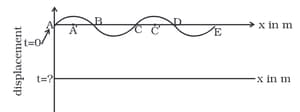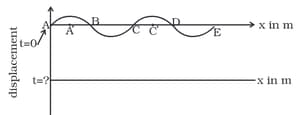NCERT Solutions for Chapter: Waves, Exercise 4: SA
NCERT Physics Solutions for Exercise - NCERT Solutions for Chapter: Waves, Exercise 4: SA
Attempt the practice questions on Chapter 15: Waves, Exercise 4: SA with hints and solutions to strengthen your understanding. NCERT Exemplar Physics - Class 11 solutions are prepared by Experienced Embibe Experts.
Questions from NCERT Solutions for Chapter: Waves, Exercise 4: SA with Hints & Solutions
The wave pattern on a stretched string is shown in Figure. Interpret what kind of wave this is and find its wavelength.
The pattern of standing waves formed on a stretched string at two instants of time is shown in Figure. The velocity of two waves super-imposing to form stationary waves is and their frequencies are .
(a) Calculate the time at which the second curve is plotted.
The pattern of standing waves formed on a stretched string at two instants of time are shown in Figure. The velocity of two waves super-imposing to form stationary waves is and their frequencies are .
(b) Mark nodes and antinodes on the curve.

The pattern of standing waves formed on a stretched string at two instants of time are shown in Fig. The velocity of two waves superimposing to form stationary waves is and their frequency is .

Calculate the distance between A' and C'.
A tuning fork vibrating with a frequency of is kept close to the open end of
a tube filled with water (Figure). The water level in the tube is gradually lowered. When the water level is below the open end, the maximum intensity of sound is heard. If the room temperature is , calculate
(a) speed of sound in air at room temperature
A tuning fork vibrating with a frequency of is kept close to the open end of a tube filled with water. The water level in the tube is gradually lowered. When the water level is below the open end, the maximum intensity of sound is heard. If the room temperature is , calculate
(b) speed of sound in air at
A tuning fork vibrating with a frequency of is kept close to the open end of a tube filled with water. The water level in the tube is gradually lowered. When the water level is below the open end, the maximum intensity of sound is heard. If the room temperature is calculate
(c) if the water in the tube is replaced with mercury, will there be any difference in your observations?
Show that when a string fixed at its two ends vibrates in loop, loops, loops and loops, the frequencies are in the ratio



